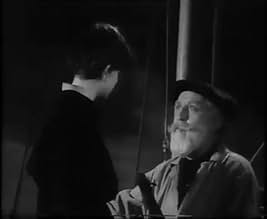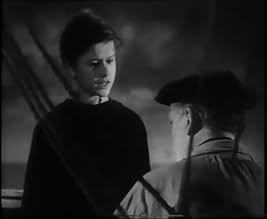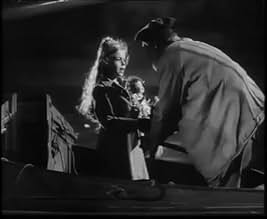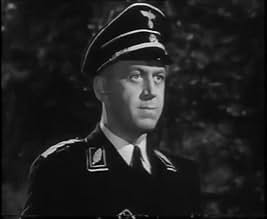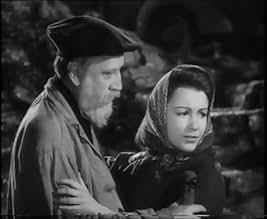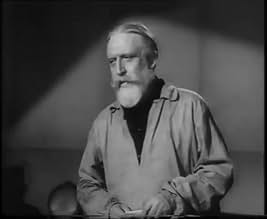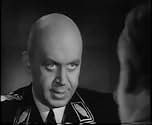Ajouter une intrigue dans votre langueWhile traveling in France during the Nazi invasion of 1940, an Englishman is entrusted with the care of a group of refugee children.While traveling in France during the Nazi invasion of 1940, an Englishman is entrusted with the care of a group of refugee children.While traveling in France during the Nazi invasion of 1940, an Englishman is entrusted with the care of a group of refugee children.
- Réalisation
- Scénario
- Casting principal
- Nommé pour 3 Oscars
- 4 victoires et 3 nominations au total
Rudolph Anders
- Lieutenant
- (as Robert O.Davis)
Avis à la une
More than a few movie stars have learned their craft through the Yale School of Acting, including Meryl Streep, Paul Newman, and Sigourney Weaver. But not many professors teaching at the Ivy League university have become successful Hollywood actors. Monty Woolley was one of the most noteworthy dramatic instructors at Yale to make a go in movies. He earned the first of two Academy Awards Best Actor nominations for his role in August 1942's "The Pied Piper," as a Brit on a fishing vacation who finds himself leading a group of youngsters to freedom. The movie so impressed the Academy members they nominated it for Best Picture.
Nicknamed "The Beard," Woolley, a Manhattan native, taught English and Drama at Yale before directing Broadway plays beginning in 1929, followed by small roles in Hollywood starting in 1936. In his first film lead, 1942 "The Man Who Came to Dinner," Woolley re-enacted his stage role of the same name. "The Pied Piper" came next, causing him to admire his own acting talents, but was even more proud of his trademark beard. "Take the beards away from Santa Claus and Bluebeard and what do you have?" asked Woolley. "Nothing but a pair of middle-aged, overstuffed bores." In "The Pied Piper," Woolley, 64, plays Howard, an Englishman visiting France near the border of Switzerland when the Germans invade. Anxious to return home, he reluctantly takes his hosts' two children, Ronnie (Roddy McDowall) and Sheila (Peggy Ann Garner) to their relatives in England. On his way via train, Howard and company run into a number of obstacles while collecting other children along the way. One child includes the Jewish niece of Nazi officer Major Diessen (Otto Preminger), who wants Howard, who's his prisoner, to take her out of France. The Nunnally Johnson-written script adapted from Nevil Shute's 1942 novel of the same name emphasizes British patriotism as well as a critique on Nazi cruelty. The negative criticism of the Nazis in the movie would never have been permitted by the Hays Office censors before Pearl Harbor, but six months after the Japanese attack the honest portrayal of the German government was allowed.
Woolley had many fans, with an equal amount of critics who didn't particularly appreciate his brand of acting. Critic Erik Beck harped on his on-screen demeanor, claiming, "His acting seems to consist of standing around, blustering, and generally acting irritated. Wooley isn't a bad actor, but he's just bluster." Film reviewer Lura Grieve countered, "I have a soft spot for Monty Woolley, who was so good in films." His role as the guardian for the kids won him the Best Actor award from the National Board of Review.
"The Pied Piper" was the first film to star Otto Preminger, 37. The Austria-Hungary born director moved to the United States with his family at the outbreak of World War One. His first passion was the stage, both acting and directing. Handling four pictures in the 1930s, he increased his directing in the mid-1940s by producing a number of classics, including 1944 "Laura" and 1959 "Anatomy of a Murder." His performance as Major Diessen in "The Pied Piper" opened the eyes of the studios, pigeonholing him in a number roles playing German WW2 officers, including Colonel von Scherback in 1953's "Stalag 17." Besides the Academy Awards nominations for Best Picture and Woolley's Best Actor, "The Pied Piper" earned Edward Cronjager his third of seven Best Cinematographer (Black-and-White) nominations.
Nicknamed "The Beard," Woolley, a Manhattan native, taught English and Drama at Yale before directing Broadway plays beginning in 1929, followed by small roles in Hollywood starting in 1936. In his first film lead, 1942 "The Man Who Came to Dinner," Woolley re-enacted his stage role of the same name. "The Pied Piper" came next, causing him to admire his own acting talents, but was even more proud of his trademark beard. "Take the beards away from Santa Claus and Bluebeard and what do you have?" asked Woolley. "Nothing but a pair of middle-aged, overstuffed bores." In "The Pied Piper," Woolley, 64, plays Howard, an Englishman visiting France near the border of Switzerland when the Germans invade. Anxious to return home, he reluctantly takes his hosts' two children, Ronnie (Roddy McDowall) and Sheila (Peggy Ann Garner) to their relatives in England. On his way via train, Howard and company run into a number of obstacles while collecting other children along the way. One child includes the Jewish niece of Nazi officer Major Diessen (Otto Preminger), who wants Howard, who's his prisoner, to take her out of France. The Nunnally Johnson-written script adapted from Nevil Shute's 1942 novel of the same name emphasizes British patriotism as well as a critique on Nazi cruelty. The negative criticism of the Nazis in the movie would never have been permitted by the Hays Office censors before Pearl Harbor, but six months after the Japanese attack the honest portrayal of the German government was allowed.
Woolley had many fans, with an equal amount of critics who didn't particularly appreciate his brand of acting. Critic Erik Beck harped on his on-screen demeanor, claiming, "His acting seems to consist of standing around, blustering, and generally acting irritated. Wooley isn't a bad actor, but he's just bluster." Film reviewer Lura Grieve countered, "I have a soft spot for Monty Woolley, who was so good in films." His role as the guardian for the kids won him the Best Actor award from the National Board of Review.
"The Pied Piper" was the first film to star Otto Preminger, 37. The Austria-Hungary born director moved to the United States with his family at the outbreak of World War One. His first passion was the stage, both acting and directing. Handling four pictures in the 1930s, he increased his directing in the mid-1940s by producing a number of classics, including 1944 "Laura" and 1959 "Anatomy of a Murder." His performance as Major Diessen in "The Pied Piper" opened the eyes of the studios, pigeonholing him in a number roles playing German WW2 officers, including Colonel von Scherback in 1953's "Stalag 17." Besides the Academy Awards nominations for Best Picture and Woolley's Best Actor, "The Pied Piper" earned Edward Cronjager his third of seven Best Cinematographer (Black-and-White) nominations.
Curmudgeonly Briton "Howard" (Monty Woolley) is doing his best impersonation of "Rudolf Rassendyl", fishing peaceably and minding his own business, when the Nazis decide to invade France. He has to get home and is persuaded to take the two "Cavanaugh" children to safety with him. There's "Ronnie" (Roddy McDowall) and his sister "Sheila" (Peggy Ann Garner) who manage to irritate their new guardian just by being there, but they are just the start of his problems as they act like a magnet for other endangered children. Before he knows it, it's like he has his own herd of cats to try and smuggle out from under the nose of the menacing "Maj. Diessen" (Otto Preminger). Terrified of being heard to speak English, he and his charges gradually learn a little about themselves and this erstwhile selfish gent starts to demonstrate an whole new set of human traits hitherto a mystery to himself. Can he manage to get them, and himself, to safety though? It's a showcase for an on-form Woolley that features a few brief appearances from Anne Baxter and J. Carrol Naish as the adventure builds slowly but quite menacingly to a denouement that has something of last year's "Pimpernel Smith" to it. McDowall's is an engaging young character and the story exudes quite a healthy degree of sentiment-free mischievous charm as Woolley delivers the goods once again.
I love "The Pied Piper." Although born in New York City, Monty Woolley strikes just the right note as a British tourist in Europe who gets roped into shepherding several French children, most of whose parents have been killed in the World War II, to safety in England or America. Woolley was nominated for a Best Actor Academy Award for this film, and the film itself was nominated for Best Picture also. The supporting cast, including Anne Baxter, Roddy McDowell, and Otto Preminger, are likewise superb.
It boggles my mind that this award-nominated film is not available on video is any form. Why is 20th Century Fox ignoring this worthy film while so many others of lesser quality are released? Heck, I'd even take it in the Fox Cinema Archives series, if nothing else.
It boggles my mind that this award-nominated film is not available on video is any form. Why is 20th Century Fox ignoring this worthy film while so many others of lesser quality are released? Heck, I'd even take it in the Fox Cinema Archives series, if nothing else.
I have to admit it...I like Monty Woolley. You can count on the old curmudgeon to make any movie worth watching, Woolley is definitely one of the classic screen's best scene stealers!
In "The Pied Piper" Woolley plays an Englishman who is visiting France when the Germans invade in 1940. Realizing his place is back home, he packs up and begins his trek to England...but with the unwelcome addition of 2 French children (Roddy McDowall and Peggy Ann Garner) whose parents fear for their safety in Nazi-occupied France.
But what should be a relatively easy journey turns into a nightmare, as French civilization crumbles around them. Every time Woolley and his companions face a crisis, another desperate child joins the group, until he finds himself the leader of quite a menagerie.
Others in the cast include Anne Baxter as "Nicole," who helps Wooley outsmart the German occupiers and Otto Preminger as "Major Diesson," the ranking Nazi who also finds he has use for Woolley and his children.
"The Pied Piper" doesn't shy away from the grim realities of war and the suffering it imposes on everyone, both young and old. One can only imagine the impact this film had on moviegoers in 1942. The film was released just 7 months after Pearl Harbor.
In "The Pied Piper" Woolley plays an Englishman who is visiting France when the Germans invade in 1940. Realizing his place is back home, he packs up and begins his trek to England...but with the unwelcome addition of 2 French children (Roddy McDowall and Peggy Ann Garner) whose parents fear for their safety in Nazi-occupied France.
But what should be a relatively easy journey turns into a nightmare, as French civilization crumbles around them. Every time Woolley and his companions face a crisis, another desperate child joins the group, until he finds himself the leader of quite a menagerie.
Others in the cast include Anne Baxter as "Nicole," who helps Wooley outsmart the German occupiers and Otto Preminger as "Major Diesson," the ranking Nazi who also finds he has use for Woolley and his children.
"The Pied Piper" doesn't shy away from the grim realities of war and the suffering it imposes on everyone, both young and old. One can only imagine the impact this film had on moviegoers in 1942. The film was released just 7 months after Pearl Harbor.
10gsloring
I happened to be only 9 yrs old when I saw this movie for the first and only time in 1967 in Novato, CA ....Even I could understand it at that age...The 2 scenes I remember best were when Woolley's character:
1. ...Asked the Nazi officer if they've captured "him yet". The officer asks: "Who?", and Woolley replies firmly: "Hitler". Officer replies back in the negative, then Woolley defiantly but bravely yells back: ''BAHH!", then strides out of the officer's room.
2...Is brought another stray child to his group by someone unknown. A woman in Woolley's group tries to speak to the child to find out more. The child replies in an unknown language. Then the womans exclaims: "That sounds like Dutch!" (The reason I remember this so much is at age 9 I was shocked to see a war scene of an orphaned child speaking a foreign language. Where were the parents?, I thought. They must have been killed...)
Le saviez-vous
- AnecdotesThe original fairy tale was based on the disappearance of the children of the Dutch - not German - village of Hamelin. Although at the time they were thought to have vanished magically, it is now believed that the children left to join one of the Children's Crusades and were taken into slavery.
- GaffesThe seven-year-old German girl near the very end of the movie (at c.1:18 and at c.1:21) speaks German with a distinct American accent.
- Citations
Howard: I have two small children!
Railroad official: At your age, monsieur, that is undoubtedly magnificent!
- ConnexionsFeatured in Minute Movie Masterpieces (1989)
Meilleurs choix
Connectez-vous pour évaluer et suivre la liste de favoris afin de recevoir des recommandations personnalisées
- How long is The Pied Piper?Alimenté par Alexa
Détails
- Durée1 heure 27 minutes
- Couleur
- Rapport de forme
- 1.37 : 1
Contribuer à cette page
Suggérer une modification ou ajouter du contenu manquant

Lacune principale
By what name was The Pied Piper (1942) officially released in India in English?
Répondre
